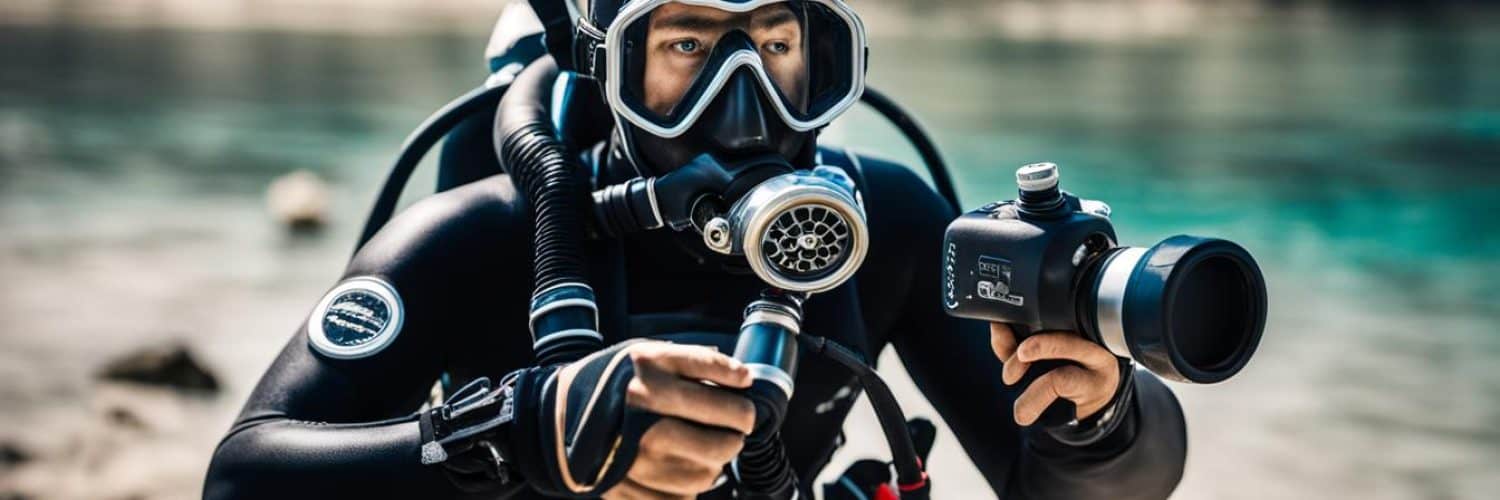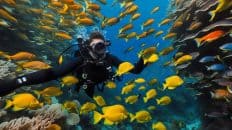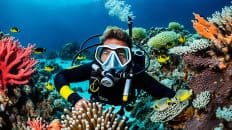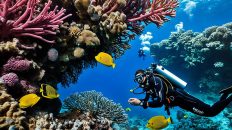When it comes to scuba diving, having a reliable scuba regulator is essential for a safe and enjoyable underwater experience. A scuba regulator is a crucial piece of equipment that ensures you have a constant supply of air while diving, allowing you to breathe comfortably and explore the wonders of the ocean depths.
But with so many options available, how do you choose the best scuba regulator for your needs? In this article, we will explore the factors you should consider when buying a scuba regulator and highlight some of the top choices in the market. Whether you’re a beginner or an experienced diver, this guide will help you make an informed decision.
Key Takeaways:
- Choosing the right scuba regulator is essential for a safe and enjoyable diving experience.
- Factors to consider include DIN or yoke regulator, budget, water temperature, ease of breathing, balance, gas compatibility, number of ports, and weight.
- Research and read reviews to find the best scuba regulator that meets your specific needs and provides reliable performance.
- Consider popular brands like Aqualung Legends, Scubapro, and Apeks for high-quality options.
- Investing in a high-quality and suitable scuba regulator is a wise decision for all divers.
DIN vs Yoke: Which is Right for You?
Choosing the right scuba regulator is crucial for a safe and enjoyable diving experience. One of the important decisions you’ll need to make is whether to go for a DIN regulator or a yoke regulator. Let’s take a closer look at the differences between these two types of regulators and which one might be the best fit for your diving needs.
DIN Regulator:
A DIN (Deutsche Industrie Norm) regulator is commonly used for diving with steel tanks or in locations that primarily use DIN valve tanks. These regulators feature a threaded connection that screws directly into the tank valve. The DIN connection provides a more secure and streamlined attachment, minimizing the risk of leaks or damage. DIN regulators are known for their high performance and reliability, making them a popular choice for technical and deep-sea divers.
Yoke Regulator:
A yoke (also known as A-clamp or INT) regulator is more common and suitable for use with aluminum tanks. Yoke regulators feature a clamping mechanism that fits over the tank valve and secures it in place. This type of connection is easier to use and allows for quick tank changes. Yoke regulators are widely used in popular dive destinations like the Caribbean and are suitable for recreational and most diving purposes.
Note: It’s important to remember that using a DIN regulator on a yoke tank is possible with the help of a converter, but using a yoke regulator on a DIN tank is not recommended due to safety concerns.
When deciding between a DIN or yoke regulator, consider the type of tanks you’ll be diving with and the locations you’ll be exploring. If you primarily dive with steel tanks or in areas where DIN valve tanks are the norm, a DIN regulator would be the most suitable choice. On the other hand, if you typically dive with aluminum tanks or in popular dive destinations, a yoke regulator would be a practical and versatile option.
Ultimately, the decision between a DIN and yoke regulator comes down to personal preference and the specific diving conditions you’ll encounter. Whichever type you choose, make sure to select a high-quality regulator from a reputable brand to ensure reliable performance and peace of mind underwater.
Consider Your Budget
When it comes to purchasing a scuba regulator, your budget is an important factor to consider. Scuba regulators are available in different price ranges, offering various features and performance levels. Whether you’re a beginner or an experienced diver, there’s a regulator that suits your needs and budget.
If you’re looking for a budget-friendly option, entry-level regulators are a good choice. These regulators typically cost up to around $350. While they may not offer advanced features, they provide reliable breathing performance for recreational diving. However, it’s important to note that budget regulators are often unbalanced and not environmentally sealed, so they may not be suitable for more demanding diving conditions.
If you’re willing to invest a bit more, mid-range regulators priced between $350 and $799 offer a balance between budget and high-end options. These regulators provide improved breathing performance, durability, and some advanced features. They are suitable for most recreational divers and offer good value for the money.
For advanced and technical divers, high-end regulators priced above $799 are designed to meet the demands of challenging dive environments. These regulators offer advanced features like environmental sealing and balancing, ensuring optimal performance even in extreme conditions. While they may come at a higher cost, high-end regulators provide the highest level of breathing comfort and reliability.
Consider your diving needs and budget when choosing a regulator. It’s important to find the right balance between cost and features to ensure a safe and enjoyable diving experience.
Comparison of Scuba Regulator Price Ranges
| Price Range | Features | Suitability |
|---|---|---|
| Budget or Entry-level | Basic features, unbalanced, not environmentally sealed | Recreational diving in warm water |
| Mid-range | Improved features, balanced, some advanced features | Most recreational diving |
| High-end | Advanced features, environmental sealing, balancing | Advanced and technical diving |
Diving in Different Water Temperatures
The water temperature is a crucial factor to consider when choosing a scuba regulator for your diving adventures. The right regulator can ensure your comfort and safety underwater, whether you’re exploring cold, warm, or tropical waters.
When diving in cold water, it’s essential to have a regulator that is specifically designed for such conditions. Cold-water diving regulators are usually environmentally sealed to prevent freezing and ensure optimal performance. Additionally, they often feature a metal second stage that handles low temperatures better than plastic ones.
“Diving in cold water requires a specially designed regulator that is environmentally sealed and can handle low temperatures. Look for a metal second stage for better cold-water performance.” – DiveMaster Joe
On the other hand, warm-water diving doesn’t require a specialized regulator. Any good-quality regulator will work well in warm water conditions. Therefore, it’s essential to focus on other factors such as comfort, ease of breathing, and durability when selecting a regulator for warm-water dives.
“Warm-water diving allows for more flexibility in regulator choice. Consider factors like comfort, ease of breathing, and durability when selecting a regulator.” – Scuba Instructor Lisa
Regulators for Tropical Waters
Tropical waters offer unique diving experiences with vibrant marine life and warm temperatures. When diving in tropical waters, it’s important to choose a regulator that can handle these conditions effectively. Look for a regulator that offers:
- Durability: To withstand the demands of tropical diving.
- Functionality: With features like an adjustable venturi lever to control airflow.
- Performance: Providing excellent breathing performance and optimal air delivery.
By selecting a regulator that meets these criteria, you can enhance your diving experience and fully enjoy the wonders of tropical waters.
Now that you understand the importance of selecting the right scuba regulator based on water temperature, let’s explore some top-rated regulators for different diving conditions.
Finding a Classic Scuba Regulator
When it comes to classic scuba regulators, one name stands out: Aqualung Legends. These regulators are renowned for their exceptional performance, reliability, and durability, making them a favorite choice among recreational and professional divers alike.
The Aqualung Legends are not just ordinary regulators; they represent a timeless design combined with advanced features that deliver excellent performance in various diving conditions. Whether you’re exploring tropical reefs or undertaking challenging dives, the Aqualung Legends will exceed your expectations.
If you’re in search of a classic masterpiece of a scuba regulator, look no further than the Aqualung Legends. Let’s take a closer look at what makes them special:
Features of the Aqualung Legends Scuba Regulator
“The Aqualung Legends scuba regulator offers the perfect balance between functionality and aesthetics. With its sleek design and top-notch performance, it’s no wonder divers rave about this classic regulator.” – Expert Diver
| Key Features | Benefits |
|---|---|
| 1. Balanced Design | Ensures smooth and effortless breathing throughout the dive. |
| 2. Environmental Sealing | Protects the internal components from water, contaminants, and freezing, making it suitable for cold-water diving. |
| 3. Adjustable Inhalation Resistance | Allows divers to fine-tune their breathing comfort based on personal preferences and diving conditions. |
| 4. Multiple Hose Ports | Provides versatility for mounting additional accessories such as dive computers, compasses, or alternate air sources. |
| 5. Lightweight and Durable Construction | Made from high-quality materials, the Aqualung Legends combine durability with a lightweight design, reducing jaw fatigue during long dives. |
As seen from these features, the Aqualung Legends scuba regulator is a true gem for divers seeking a classic regulator without compromising on performance or reliability.
Experience the legacy of the Aqualung Legends scuba regulator and elevate your diving adventures to new heights.
Best Regulator for Traveling Divers
When it comes to traveling as a scuba diver, having a lightweight and compact scuba regulator is essential. Not only does it make packing easier within the airline baggage restrictions, but it also ensures that you have a reliable and high-performing regulator wherever your diving adventures take you.
One of the top choices for traveling divers is the Aqualung Helix Compact PRO. Weighing under 1 kg, this regulator offers the perfect balance between durability and performance while minimizing the weight you need to carry. Its compact design makes it easy to fit into your travel gear without compromising on functionality.
Designed specifically for travel, the Aqualung Helix Compact PRO is suitable for both tropical and cooler waters. Whether you’re exploring vibrant coral reefs or diving in colder destinations, this regulator will deliver the reliability and ease of breathing you need to fully enjoy your underwater experiences.
The lightweight design of the Helix Compact PRO also makes it a convenient choice for divers on the go. You can move effortlessly through the water without feeling weighed down, allowing you to explore with comfort and freedom.
So, if you’re a traveling diver in search of the best regulator for your adventures, look no further than the Aqualung Helix Compact PRO. Its lightweight construction, durability, and exceptional performance make it the perfect companion for your underwater explorations.
Top-rated Scuba Regulators for Cold Water Diving
When it comes to cold water diving, having a reliable and high-performing scuba regulator is crucial. One top-rated option that enthusiasts highly recommend is the Apeks MTX-RC scuba regulator.
This regulator is specifically designed to excel in challenging cold water environments, ensuring excellent breathing capabilities even in extreme conditions. It is built to withstand the pressures and temperatures that cold water dives often present.
The Apeks MTX-RC scuba regulator is rigorously tested and certified for use in cold water conditions, providing divers with peace of mind and confidence. Its over-balanced diaphragm design ensures superior performance, allowing divers to experience smooth and effortless breathing.
Whether you’re exploring icy waters or diving in colder temperatures, the Apeks MTX-RC scuba regulator is a trusted companion that will keep you safe and comfortable throughout your dives.
Top-rated Scuba Regulators for Temperate Water Diving
When it comes to exploring the wonders of temperate water diving, the Scubapro MK25 Evo with 620Ti Second Stage is a regulator that stands out from the rest. Designed with versatility and performance in mind, this regulator is the ideal companion for divers who want to explore various diving conditions with ease.
Whether you’re embarking on a serene reef dive or diving into the depths of challenging wreck sites, the Scubapro MK25 Evo delivers exceptional breathing performance, ensuring you can fully enjoy your underwater adventures. Its innovative design not only provides a smooth and easy breathing experience but also offers freeze-resistance, making it a reliable choice even in colder water.
One of the key features of the Scubapro MK25 Evo is its second stage, the 620Ti. This advanced second stage incorporates high-quality titanium components, resulting in a lightweight and durable regulator without compromising on performance. With the Scubapro MK25 Evo, you can count on unparalleled reliability and long-lasting performance in temperate water conditions.
For divers seeking a regulator that can adapt to a variety of diving environments, the Scubapro MK25 Evo with 620Ti Second Stage is a top-rated choice. Its versatility, innovative design, and freezing resistance make it a reliable companion for any temperate water dive.
| Features | Benefits |
|---|---|
| Exceptional breathing performance | Ensures a smooth and effortless breathing experience |
| Freeze-resistant design | Reliable performance even in colder water temperatures |
| Lightweight and durable titanium components | Ensures long-lasting performance without sacrificing durability |
| Versatile and suitable for various diving conditions | From calm reef dives to challenging wreck dives |
Conclusion
Choosing the right scuba regulator is crucial for a safe and enjoyable diving experience. With so many options available, it’s important to consider several key factors when making your decision.
Firstly, determine the type of regulator that suits your needs – DIN or yoke. This choice is based on the location where you’ll be diving and the type of tanks you’ll be using.
Next, consider your budget. There are scuba regulators available for every price range. Whether you’re looking for an affordable option or a high-end regulator with advanced features, there is something for everyone.
Lastly, take into account the water temperature, ease of breathing, balance, gas compatibility, number of ports, and weight. These factors will ensure you find a scuba regulator that meets your specific needs and provides reliable performance.
Before making a purchase, it’s always a good idea to read scuba regulator reviews and gather insights from others who have used the regulators you are considering. This will help you make an informed decision and find the best scuba regulator for your diving adventures.
Remember, investing your time in finding a high-quality and suitable scuba regulator is a wise choice. It will enhance your diving experience and provide you with peace of mind underwater.
FAQ
What factors should I consider when buying a scuba regulator?
When buying a scuba regulator, you should consider factors such as whether you need a DIN or yoke regulator, the cost, whether you’ll be diving in cold or warm water, ease of breathing, whether the regulator is balanced or unbalanced, compatibility with different gases, the number of ports, and the weight of the regulator. It’s important to choose the right regulator based on your specific diving needs and preferences.
What is the difference between a DIN and yoke regulator?
DIN regulators are recommended for diving with steel tanks or in locations that primarily use DIN valve tanks. Yoke regulators are more common and suitable for use with aluminum tanks and in popular dive destinations like the Caribbean. It’s also possible to use a DIN regulator on a yoke tank with the help of a converter, but using a yoke regulator on a DIN tank is not recommended due to safety concerns.
What are the different price ranges for scuba regulators?
Scuba regulators are available in different price ranges. Budget or entry-level regulators cost up to around 0 and are generally unbalanced and not environmentally sealed. Mid-range regulators, priced between 0 and 9, offer a balance between budget and high-end options and are suitable for most recreational divers. High-end regulators, priced above 9, are designed for advanced and technical divers, offering features like environmental sealing and balancing. Consider your diving needs and budget when choosing a regulator.
Do I need a different scuba regulator for cold-water diving?
Yes, the water temperature can greatly affect your choice of scuba regulator. Cold-water diving requires a regulator that is environmentally sealed and can handle low temperatures without freezing up. A metal second stage is also recommended for cold-water diving. In contrast, any regulator is suitable for use in warm water. If you’ll be diving in tropical waters, look for a regulator that offers durability, functionality, and performance in those conditions.
What is a popular classic scuba regulator?
Aqualung Legends are popular classic scuba regulators known for their exceptional performance, reliability, and durability. They are a favorite choice among recreational and professional divers. The Aqualung Legends offer advanced features, timeless design, and excellent performance in various diving conditions. If you’re looking for a classic masterpiece of a scuba regulator, the Aqualung Legends should be on your radar.
What is the best scuba regulator for traveling divers?
Traveling divers need lightweight and compact scuba regulators that are easy to pack within airline baggage restrictions. The Aqualung Helix Compact PRO is a top choice for traveling divers, weighing under 1 kg but still offering durability and performance. It is designed specifically for travel and is suitable for both tropical and cooler waters. The lightweight design of the Helix Compact PRO makes it a convenient and reliable choice for divers on the go.
What is a top-rated scuba regulator for cold water diving?
The Apeks MTX-RC scuba regulator is highly recommended for cold water diving. It has excellent breathing capabilities even in challenging environments and is designed to withstand the extreme pressures and temperatures of cold water dives. The regulator is tested and certified for use in cold water conditions and features an over-balanced diaphragm design for superior performance. If you’ll be diving in colder waters, the Apeks MTX-RC is a reliable choice.
What is a top-rated scuba regulator for temperate water diving?
The Scubapro MK25 Evo with 620Ti Second Stage is an excellent choice for temperate water diving. It is designed to perform well in a variety of diving conditions, from calm reef dives to challenging wreck dives. The regulator’s innovative design also makes it resistant to freezing, ensuring reliability even in colder water. If you’re looking for a versatile and high-quality regulator for temperate water diving, the Scubapro MK25 Evo is worth considering.
How do I choose the right scuba regulator?
Choosing the right scuba regulator is essential for a safe and enjoyable diving experience. Consider factors such as the type of regulator (DIN or yoke), budget, water temperature, ease of breathing, balance, gas compatibility, number of ports, and weight. Research and read reviews to find the best scuba regulator that meets your specific needs and provides reliable performance. Whether you’re a beginner or an experienced diver, investing in a high-quality and suitable scuba regulator is a wise decision.







Add comment